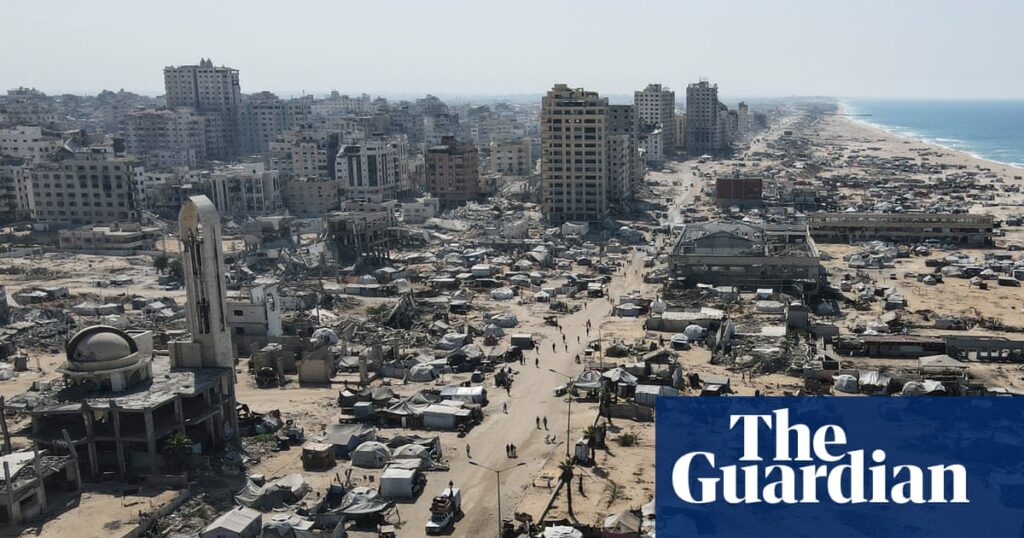Australian visa holders in Gaza have the paperwork they need to flee the razed Palestinian territory but remain trapped due to closed borders, prompting refugee advocates to intensify calls for support.
Ahmed Abumarzouq’s two nephews were granted humanitarian visas on 15 October – two days after all living Israeli hostages were returned to Israel under the tentative Gaza ceasefire plan, which has not yet produced a possible border re-opening. For the small number who are eligible for Australian consular assistance – those whose immediate family members are citizens or permanent residents – the pathway to Australia is still complex.
Abumarzouq’s two nephews, aged 18 and 19, are ineligible for this assistance. All the teenagers can now do is wait in their makeshift home in Gaza City for the territory’s Rafah crossing – controlled by Israeli forces – to open.
Sign up: AU Breaking News email
“I was hoping that the border will open and I’d be able to get them out,” said Abumarzouq, a chief financial officer with the Western Australian government who lived through multiple wars in Gaza before moving to Perth in 2014.
“But, there’s not really anything I can do.”
The nephews’ approved visitor visas expired after the Rafah crossing, the only possible exit, closed in May 2024. Since then, leaving the war zone has been limited to a tiny number of evacuees, mostly on medical grounds. As soon as the teenagers are able to, they will fly to join their relatives in Australia.
An estimated 600 to 700 people in Gaza hold Australian visas, according to the home affairs minister, Tony Burke, although on Sunday he said the home affairs department was unsure how many of those people were still alive.
“Some people in that number will choose to stay, some people may end up with other options that they’d prefer to take, and there will be some people who we don’t hear from again – and there’s some on that case list that we haven’t heard from for a very long time,” he told the ABC.
“A significant number of them are part of split family groups where some of the family is in fact here in Australia, and they’re wanting to join.”
Many members of split families have not been granted visas. Abumarzouq has also applied for visas for his brother, his brother’s wife and their daughter, but they were rejected.
“The two boys were approved but the rest were not. I don’t know why, I applied the same way for all of them. It’s hard, you feel helpless,” he said.
“It’s been a cycle for the last two years now, you fill in paperwork, you pay fees, in the end you only get half results for everything.”
Another Palestinian Australian, who asked for his name to be withheld for privacy reasons, applied for visas for 27 members of his family in December 2023. All were rejected with no reason given.
He is now awaiting the outcome of a humanitarian visa application for his mother which he submitted in August.
He says the ceasefire has “not at all” made a difference to his relatives’ hopes of leaving. For now, he can only wait for his mother’s visa outcome.
“Given the current situation and fragility of the ceasefire now, it’s very concerning and agonising, really, to wait for a response,” he said.
after newsletter promotion
A Department of Foreign Affairs and Trade spokesperson said the Australian government was “doing all it can to support Australians, permanent residents and their immediate family members still in Gaza who wish to depart” and “coordinates with governments in the region” to facilitate assisted departures.
“Exiting Gaza remains difficult.”
The centre director and principal solicitor at the Refugee Advice and Casework Service, Sarah Dale, said for the small number of Australia visa holders in Gaza eligible for consular assistance, travel through Gaza remained “fraught”.
“Border crossings remain perilous, it has required immense strength and courage of the people fleeing in order to get out,” she said.
Dale said despite the ceasefire, supporting people to evacuate from Gaza, particularly those seeking to reunite with families, was “absolutely the right thing to do” and consistent with Australia’s approach to displacement for decades.
“Escaping a war zone, ceasefire or not, is not the test for the exercise of our compassion.”
The founder and executive director at Palestine Australia Relief and Action, Rasha Abbas, said Palestinians in Gaza did not want to leave their home.
“It’s forced displacement. [Israel has] taken away all security, all safety, and there’s nothing in terms of basic life needs, no hospitals, no education, no food, no homes,” she said.
Guardian Australia understands between Hamas’ attack on 7 October 2023 and 31 December 2024, 1,921 Palestinian citizens arrived in Australia, which includes people travelling multiple times. In the same period, Australia granted 3,449 visas to Palestinians who met legal requirements, including health, character and security criteria. The figure includes Palestinians who have held more than one visa.

